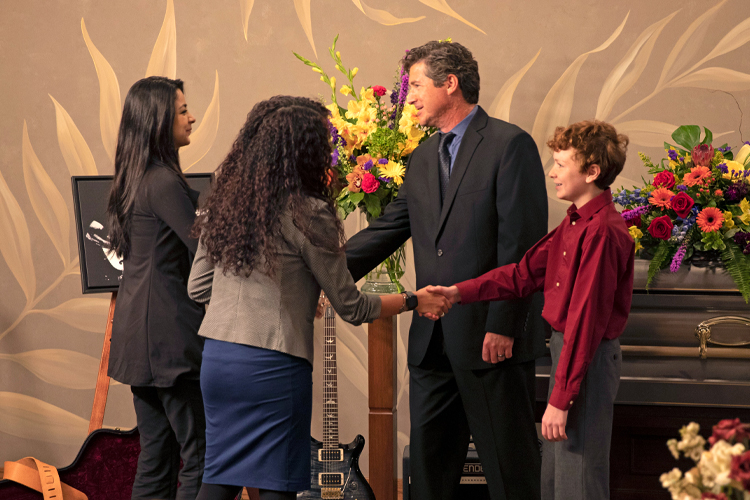Children & Funerals
Honesty and Involvement
As a family-owned funeral home, we genuinely care about the well-being of your loved ones. Most experts and families agree the healthiest way to help a child cope with loss is through honesty and involvement in the funeral rituals.
Oftentimes, parents want to protect children from dealing with the harsh reality of death. But denying children the chance to remember and say goodbye shuts them out of an event that can help them grow. Dr. Elizabeth Kubler-Ross, a noted psychiatrist, says, “If they are old enough to love, they are old enough to grieve.”
Funerals help a child develop a healthy and realistic attitude about death. How children grieve and participate in the rituals will help determine how they will face future sorrows.

What to Expect
Let children know what to expect: who will be there, what they will be doing, where and when this will take place and how people might act or feel. Explain that they might see tears, straight faces or laughter. It may help to explain that a funeral is a time to:
- Express sadness because someone has died
- Honor the person who died and celebrate his or her life
- Help comfort and support each other
- Remember that life goes on
Describe how the room is set up and where the person who died will be—in a casket (open or closed) or cremated—and how that person will look (use of make-up) and feel (cold) if the child were to touch the person who died. Avoid phrases like “sleeping,” “passed away” and “lost.”
Explain the purpose of each ritual. There are certain terms like casket and visitation that you may want to explain to your children (see Funeral Terms). Older children may want to know what to say (see Funeral Etiquette). Providing as much age-appropriate, factual information up front will help arm children with the understanding they’ll need to face an event that may be new to them.
Talking about Death
Let children know it is healthy to talk about death. Find out what your child already knows and validate any feelings he or she may express. Then, speak simply and honestly. Don’t be afraid to answer questions with “I don’t know the answer, but I’ll get back to you on that.”
Encourage open dialogue and freedom to express feelings and opinions. Consistent attention and time are important in helping children come to terms with their loss.
Some children may feel responsible for the death—they forgot to visit last week or said a mean word yesterday—it is important to communicate that they were in no way responsible.
Explain how you might feel when someone dies—sad, mad, confused—and that it is OK to cry or want to talk or need time alone. You may also want to explain that it is normal to laugh at funny stories or smile at fond memories of your loved one.
Children learn by example, so don’t hide your own feelings. Showing your own grief gives children permission to show theirs. Holding grief back may inadvertently teach children to suppress their own sad feelings.
Behavior at Funerals
Explain to children that certain behavior will be expected of them: sitting still, talking nicely to adults and not running around.
Space permitting, Krause Funeral Homes will help set up a special children’s area in the corner of a visitation room or a separate room altogether. TVs and DVD players are available along with room for toys, snacks or simple art supplies. Some families assign friends or family to keep the kids occupied, while others prefer using paid caregivers.
Involving Children
If an immediate family member has died, give children permission to be involved. They may be interested in helping choose the casket, outfit, jewelry, special handkerchief or scarf, music or readings. Older children may read poems or scripture, shyer children may light candles, and younger children may place letters, artwork or mementos into the casket.
Kid-Focused Touches
Children remember more tangible events at services.
Ask your child if they would like to take part in a dove, butterfly or environmentally friendly balloon release to signify the end of the funeral or the circle of life.
Oliver, Krause Funeral Homes’ trained on-staff therapy dog, helped children for many years. Petting or hugging Oliver had a calming effect and triggered happy memories. We are looking forward to having a therapy dog to offer our families again. Bennie is currently being trained as Krause Funeral Home’s new therapy dog.
When Children Do Not Want to Attend
If a child does not want to attend the funeral, gently mention that he or she may later regret missing out on this important day. Remind the child that a close relative or adult friend will be nearby the whole time. If a child absolutely does not want to attend a visitation or funeral, do not force him or her to do so. Try to have the child attend at least one small part; taking part in even some of the rituals helps the child to understand and feel less alone. It is important to continue to assist your child in his or her grieving process.
Older generations may not be used to involving children in funerals and warn the children will be afraid, ask too many questions, not understand or be a disturbance. Only you can decide what is right for your family and how you want to help your family to grieve.
To learn more, Nichole Schwerman, Bereavement Coordinator at Children’s Hospital of Wisconsin recommends the following books:
A Grief Observed, C.S. Lewis
Beyond Tears, Ellen Mitchell
Guiding Your Child Through Grief, Mary Ann and James Ernswiler
